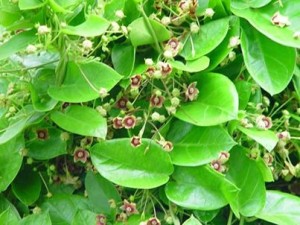Ipecacuanha was a genus of flowering plants in the Rubiaceae family but is no longer recognized. It has been sunk into synonymy with Psychotria.
Contents
Uses
Brazilian Indians valued ipecac as a remedy for dysentery, and this information was brought to Europe by Portuguese missionaries. The dried root and rhizome are the source of the medicinally useful products. Ipecac has been widely used in syrup form as a potent and effective emetic. Ipecac powder had been used to induce sweating at the onset of influenza, and small amounts of the extract have been incorporated into cough syrups as expectorants. Emetine, derived from the root, has been used for more than a century to treat dysentery.
Benefits
Ipecac is a plant. It is used to make medicine. Ipecac syrup is available both as a nonprescription product and as an FDA-approved prescription product.
Ipecac is taken by mouth to cause vomiting after suspected poisoning. It is also used to treat bronchitis associated with croup in children, a severe kind of diarrhea (amoebic dysentery), and cancer. Ipecac is also used as an expectorant to thin mucous and make coughing easier. Small doses are used to improve appetite.
Health professionals sometimes give ipecac by IV (intravenously) for hepatitis and pockets of infection (abscesses).
Cautions
Ipecac is POSSIBLY SAFE for most people when taken by mouth and used for a short time. It can cause nausea, vomiting, stomach irritation, dizziness, low blood pressure, shortness of breath, and a fast heartbeat.
Ipecac is POSSIBLY UNSAFE when allowed to touch the skin or when inhaled. Ipecac contains emetine, with can irritate the skin and respiratory tract.
Ipecac is LIKELY UNSAFE when taken by mouth long-term or in large amounts, as well as when injected at a dose of more than 1 gram. Misuse of ipecac can lead to serious poisoning, heart damage, and death. Signs of poisoning include difficulty breathing, digestive tract problems, abnormal heart rates, blood in the urine, convulsions, shock, coma, and death.
Interactions
- Activated charcoal interacts with IPECAC
Activated charcoal can bind up syrup of ipecac in the stomach. This decreases the effectiveness of syrup of ipecac.
Other names
References
Source: Wikipedia, https://en.wikipedia.org/wiki/Ipecacuanha
Drugs.com, http://www.drugs.com/npc/ipecac.html

